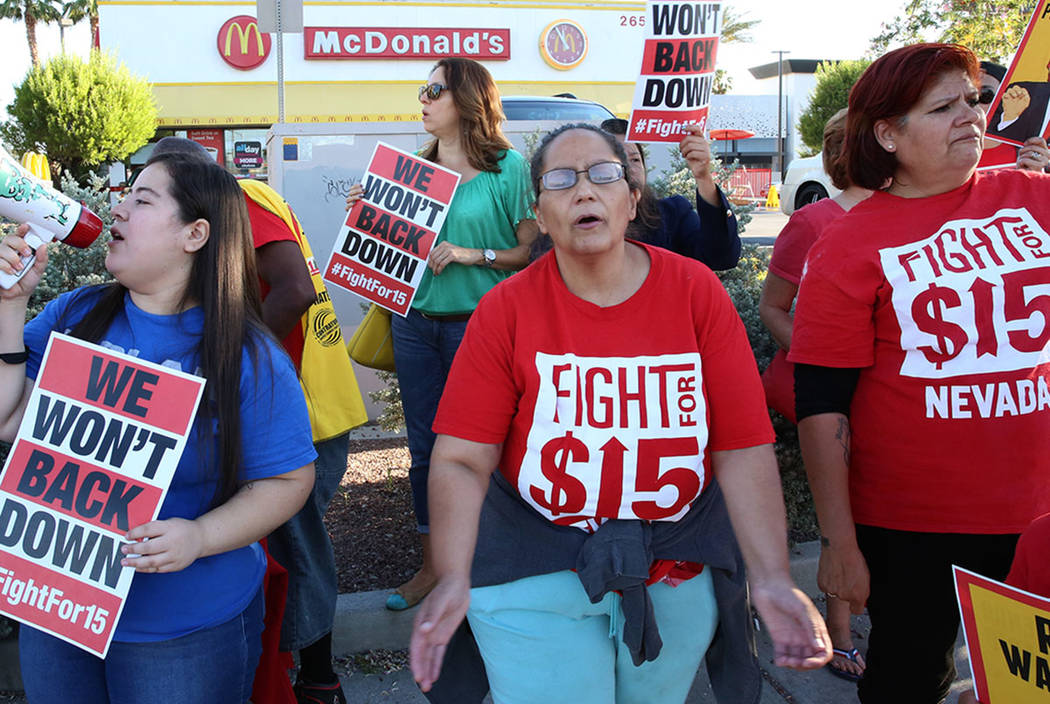COMMENTARY: Minimum wage bill will hurt Nevada businesses
Nevada restaurants and taverns are diverse and unique, and 220,000 employees make their living supporting this key part of the hospitality industry. That’s why the one-size fits all approach to raising the minimum wage — such as Assembly Bill 456, which passed the Assembly on Tuesday — is not the answer.
Without provisions to define how overtime works within a 24-hour day, to implement a youth wage and training wage and to establish of a tip credit for employees who already make $20 to $40 per hour, this bill would cause restaurant owners to cut costs — and even jobs — in order to pay for the increase.
Restaurants and taverns are where hardworking employees gain skills and expand their abilities, whether it’s a working parent drawn to flexible hours and the earning potential from tips, an entry-level worker or even a former inmate re-entering the workforce to make a fresh start. All have found meaningful and productive work in our industry.
More than 15 million U.S. workers are employed by restaurants. In Nevada, the number of workers in the industry is expected to climb by more than 30,000 in the next decade.
Nearly 90 percent of establishments are small and family-owned operations, while seven in 10 are single-unit operations. Nine in 10 restaurant and tavern managers began their careers in entry-level positions before advancing up the ranks. Eight in 10 current restaurant owners say their first job in the industry was an entry-level hourly position.
Six in 10 Americans have worked in our industry at some point in their lives and one in three got their first job in a restaurant. The U.S. restaurant industry is the leading employer of teenagers in every state.
Restaurants operate with constantly fluctuating input costs: talent retention and training, ingredients and supplies, produce and perishables, marketing, insurance, décor, training and more. Regardless of size, restaurants operate on single-digit profit margins, much lower than many other sectors of the economy.
This diversity and breadth are why a one-size-fits-all model doesn’t work.
We support raising the minimum wage, but we support doing so as part of a conversation that will ensure a steady and flexible pace so that small and family-owned businesses don’t buckle when it is implemented. We support providing flexibility that reflects a state as diverse as Nevada — restaurants in Ely or Winnemucca operate in a different market than fine dining establishments in Reno, Tahoe or Vegas.
We support providing a youth wage so that teenagers can continue to find a first job in our industry. Let’s be mindful that teenagers working their first jobs and living at home are very different than mid- or late-career professionals working for higher wages and tips.
We support stopping the 24-hour rolling overtime rule so that workers can voluntarily take advantage of the flexibility and earning potential found in our industry.
And we support establishing a tip credit like that in place in 43 other states. This system ensures that workers earn at least the state minimum wage, in addition to tips. The average restaurant salary earned by tipped workers nationwide with a tip credit in place ranges from $19-25 per hour. Some Las Vegas food servers and bartenders make $50,000 to $70,000 per year.
Some activists claim restaurant workers do not earn minimum wage. This is false. In the exceedingly rare case where a shift is slow or workers do not earn at least an amount equal to the minimum wage in tips and wages, the employer owes them — by law — at least the state minimum wage.
Minimum wage hikes that went too far in New York City triggered shutdowns for more than 500 establishments. In San Francisco, an owner who moved away from the tip-plus-wage model reported that his average employee salary dropped from $45 with tips to $20 per hour after the change. In each case, talented professionals — career servers — left the establishments or the industry. In a state built on hospitality and professional, top-quality service, that threat is real and serious.
Let’s raise the minimum wage. But let’s do it in a way that helps our workers and their employers avoid what happened in New York and elsewhere when wage hikes had unintended consequences. In Nevada, let’s have a conversation about this process, because we believe there is a better way.
Brian McMullan is the owner of McMullan’s Irish Pub and a member of the Save My Job Nevada Coalition.




























